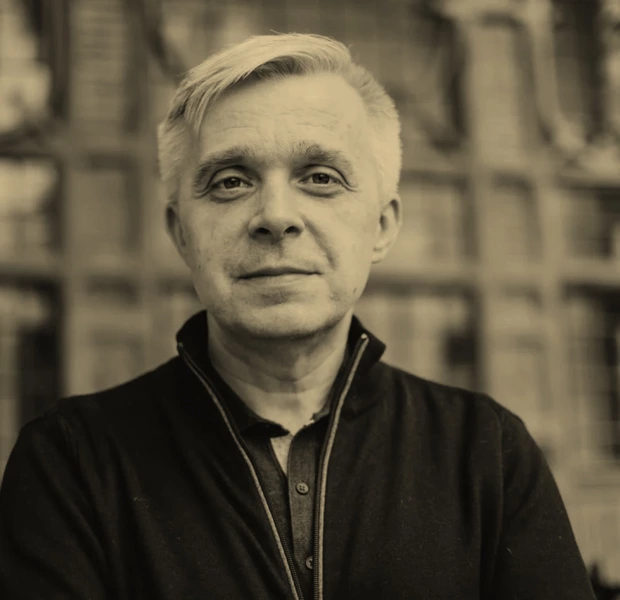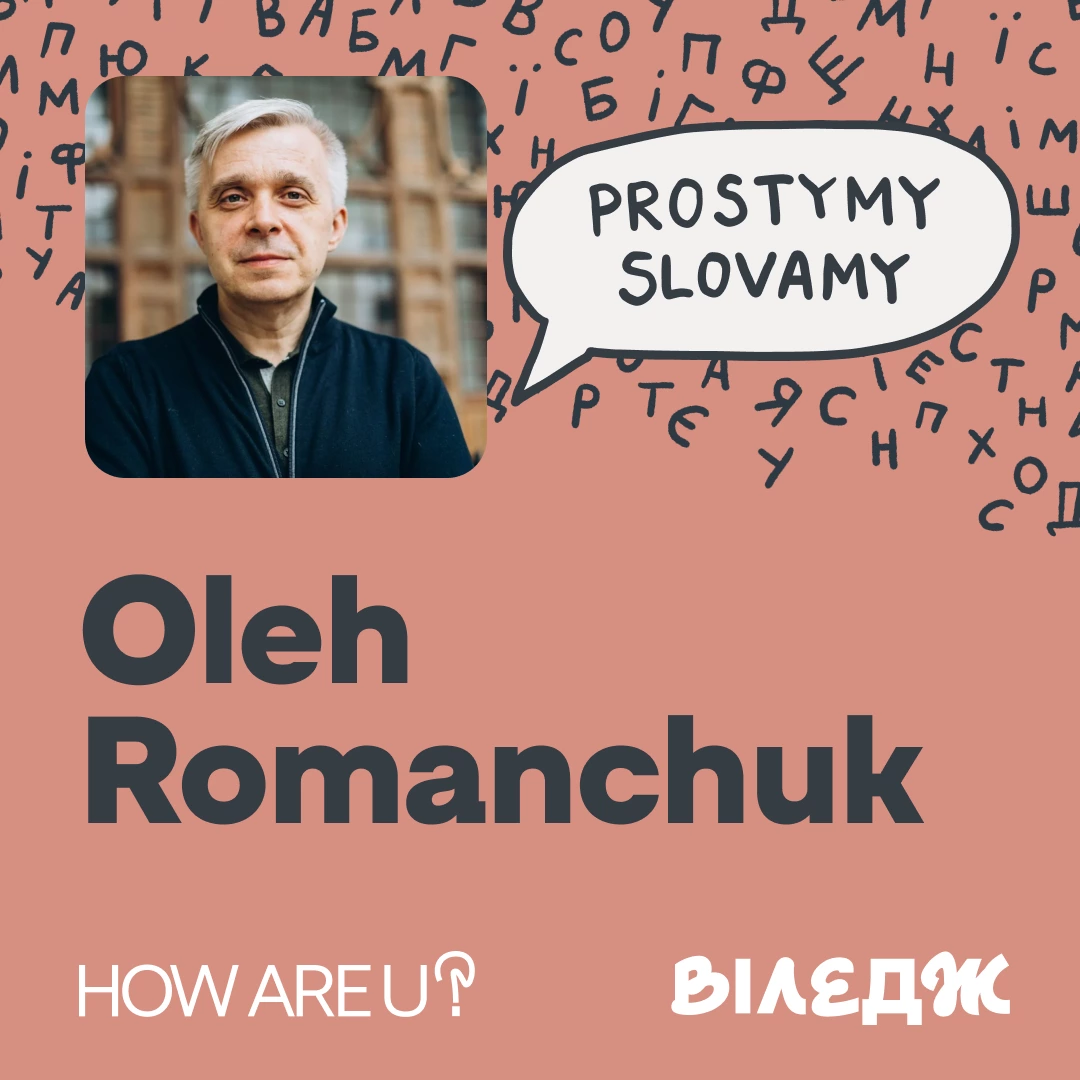
Suffering doesn’t make us stronger. Psychotherapist Oleh Romanchuk explains what does

«Simple Words»
Podcast about mental health
Do we have a choice in how we respond to traumatic events? What is required of us to be able to make that choice? What can help us recover and grow in the wake of trauma? Is personal growth possible in the midst of a crisis, or can it only occur after it’s over?
Psychotherapist Oleh Romanchuk shares research on post-traumatic growth and what can enable it in the most recent episode of the In Simple Words podcast.
The ‘Science of Resilience’ season of the In Simple Words podcast is supported by Ukraine’s First Lady Olena Zelenska’s How Are You? mental health initiative, the Coordination Centre for Mental Health of the Cabinet of Ministers of Ukraine, and the World Health Organization.
You can find the episode wherever you listen to podcasts
Trauma can be a source of growth rather than destruction
Post-traumatic growth is a common outcome of traumatic experience, suggesting that resilience in the face of trauma can help us avoid post-traumatic disorder. Trauma can in fact help us mobilize resources that can facilitate individual and collective transformation. Romanchuk says that understanding post-traumatic growth is particularly important in the context of what’s happening in Ukraine as it can offer a source of hope.
Post-traumatic growth and change
Richard Tedeschi and Lawrence Calhoun are two of the most prominent researchers studying post-traumatic growth today. The pair landed on the concept while conducting a study on participants who had faced major challenges in their lives, noting that each of those participants had experienced similar changes in the face of trauma:
- changes in their relationships with others;
- changes in their perception of their personal strength;
- new opportunities created by the traumatic experience;
- a more profound sense of gratitude for the life they have;
- spiritual or existential insight: changes in how they saw their purpose in life.

What are the indicators of post-traumatic growth?
Post-traumatic stress disorder (PTSD) often manifests as a feeling that nothing good will ever happen in your life again and that you will inevitably face more traumatic experiences. These expectations can paralyze you and prevent you from doing things, Romanchuk explains, because you think that any good experiences cannot last and anything that makes you happy will be destroyed.
On the contrary, post-traumatic growth enables you to come to terms with the fact that you might face new challenges, but you will be able to carry on living and creating, and that in spite of suffering there will always be light, joy, and happiness in your life.
We are not always responsible for what happens to us, but we are responsible for how we process and respond to those experiences. Most crucially, we are responsible for how we incorporate them into our self-narrative.
At the core of post-traumatic growth is the refusal to see ourselves as victims of circumstances and the reclamation of agency over how we choose to live our lives.

Growth is a choice you make everyday
Post-traumatic growth won’t happen suddenly. It won’t magically transport you to a new reality.
You have to choose hope, resilience, and light everyday if you are committed to growth. You have to choose those things over catastrophization, anxiety, naivety, and the desire to shut your eyes to reality.
Suffering doesn’t make us stronger
It’s important not to romanticize suffering. Suffering doesn’t make us stronger. Suffering only brings pain. You don’t need to be grateful for suffering or seek it out. Growth can only occur when particular choices are made in the wake of suffering.
“Sometimes I imagine that suffering is like a heavy weight hanging over me and I have to seek out community in order to avoid being squashed by it,” Romanchuk says.
You can’t grow if you’re all alone
It’s important to seek out community for help withstanding the stress and pressure of trauma. We tend to find strength in one another and can achieve much more together than alone. A larger sense of unity grows when people collectively experience challenges. Sebastian Junger describes this in his book Tribe. Many of the people Junger interviewed in postwar Bosnia told him they missed the sense of unity, love, and generosity they had experienced during the war.

What can you do if you don’t have a community to draw on?
You may think that a community is a group of people that you must first find, and then somehow join, and that they will unconditionally welcome and accept you –– but at its core, Romanchuk explains, community is a feeling of belonging to a group of people who share your values and your path in life.
This enables us to feel that we belong to a community even when we are physically alone, as long as we know who we are, what our values are, and understand that there are others who share those values. We can feel a sense of community with people who came before us and with those who will come after, for whose sake we work and make sacrifices.
Freedom is the second dimension of posttraumatic growth. In a letter written before her death, paramedic Iryna Tsybukh says that we are often limited by our fear of being ourselves and wanting to please others. War made her realize that we should stop being afraid and start being ourselves, that this is true freedom. We must have courage to live the lives we want to live, rather than the lives that we think would please or impress others.
This acute awareness of how we live our lives is entangled with our awareness of our mortality, which can help us reconnect with our values and with what makes life meaningful. Romanchuk says that the keys to growth are to love deeper and to be more engaged in life.
Maintaining a community takes work
In order to maintain a sense of community, we need to love, be grateful, forgive and ask for forgiveness, admit our mistakes, communicate, confront difficult moments with love, and gather around shared values. All this takes a lot of work, but we must remember that our future growth depends on this work.
There is a risk that once circumstances change, politicians will once again start fighting and we will all start finding fault with each other and quarreling, as if achieving safety and security means that we no longer need to maintain our unity. Romanchuk says that one of the biggest challenges we will face in the future is maining unity and working together to further strengthen it

Internal growth factors
Post-traumatic growth doesn’t occur on its own. It operates along certain dimensions.
The first dimension is courage and resilience, our belief that each experience makes us more capable of overcoming difficulties. Courage and resilience enable us to move forward, be brave, and not be afraid of our lives. Romanchuk recalls an African saying that smooth seas do not make skilled sailors.

Can you grow even amid long-term stress?
Growth always takes time. Right now Ukrainians are focusing all of their energy on surviving and coping with immediate danger. But survival requires resilience, which in turn is the basis for post-traumatic growth.
Coping with the challenges Ukrainians are facing now therefore helps them build muscle that in the future will enable them to heal and use their emotional resources to create the life they want rather than to simply survive this war.
Listen podcast «Simple Words» on YouTube
THE SEASON "SCIENCE OF RESILIENCE" OF THE "IN SIMPLE WORDS" PODCAST IS RELEASED AS PART OF THE INITIATIVE OF FIRST LADY OLENA ZELENSKA TO IMPLEMENT THE ALL-UKRAINIAN MENTAL HEALTH PROGRAM "HOW ARE YOU?" THE PROJECT WAS IMPLEMENTED IN COOPERATION WITH THE COORDINATION CENTER FOR MENTAL HEALTH OF THE CABINET OF MINISTERS OF UKRAINE, WITH THE SUPPORT OF WHO



